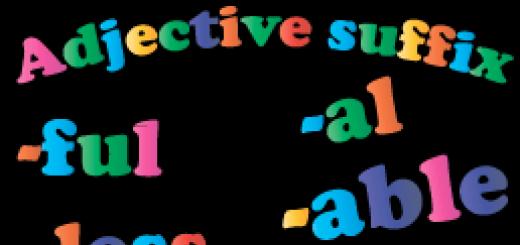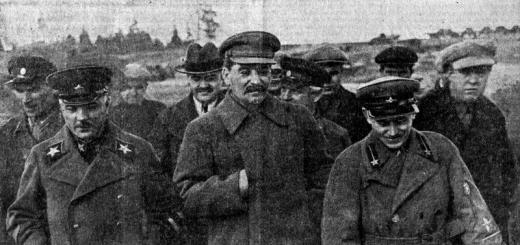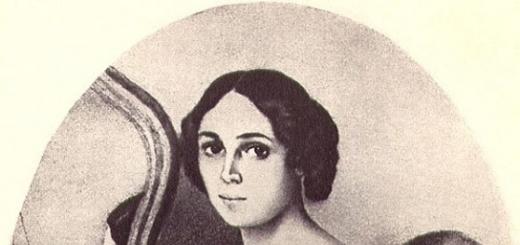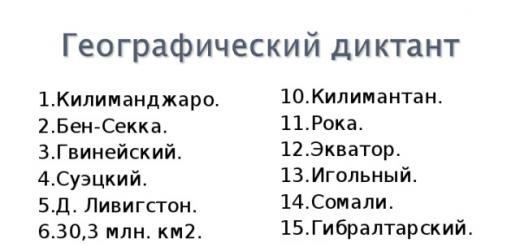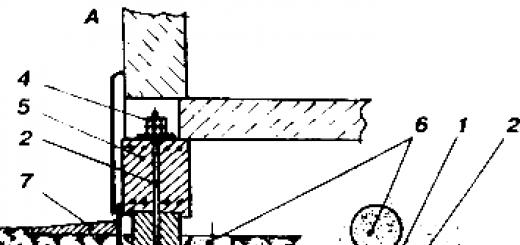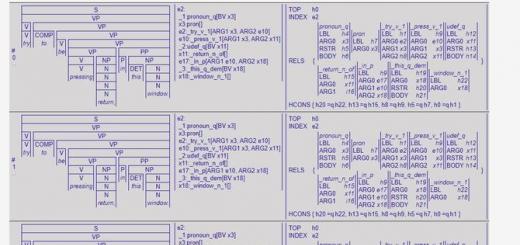Adjectives in English have two degrees: comparative Comparative and superlative Superlative.
Education of degrees of comparison
1. If the adjective consists of one syllable (one-syllable adjective), then the comparative degree is formed using the suffix –er, and the superlative degree is formed using the suffix –est, which are attached to the base form of the adjective:
Adjective Comparative Superlative
full fuller fullest
soft softer softest
green greener greenest
thick thicker thickest
Note: Sometimes spelling changes occur when adding suffixes to adjectives. So, if a word ends in –e, then when adding suffixes the letter e is usually omitted:
large – larger-largest
Exception: be – being
If a word ends in a consonant + y, then when adding suffixes, y will change to i:
happy – happier – happiest
easy – easier – easiest
If a word ends in a vowel + y, then the y will not change when adding suffixes:
grey-grey-greyest
If a one-syllable adjective ends in one vowel and one consonant, then before the suffixes the last consonant is doubled:
thin- thinner - thinnest
big – bigger – biggest
2. If the adjective consists of two or more syllables, then the comparative degree is formed using the word more, and the superlative degree - using the word most, which are placed before the adjective:
magical – more magical – most magical
correct – more correct – most correct
ambitious – more ambitious – most ambitious
3. If an adjective consists of two syllables (a two-syllable adjective) and ends in - y, then when forming degrees of comparison, the suffixes - er and -est are used, while -y changes to i:
sunny – sunnier – sunniest
happy – happier – happiest
Note: Some two-syllable adjectives that do not end in -y form degrees of comparison in this way, such as: narrow, simple, quiet, gentle, clever.
4. Degrees of comparison of some adjectives are not formed according to general rules, that is, they are exceptions. These are the adjectives you need to remember:
good – better – best (good – better – best)
bad – worse – worst (bad – worst – worst)
far – farther/further – farthest/furthest (far – more distant – the farthest)
old – older/elder – oldest/eldest (elder – older – oldest)
little – less – least (small – less – smallest)
much/many – more – most (much – more – the biggest)
Using degrees of comparison
comparative
1. The comparative degree is used when it is necessary to compare one person, object, category, concept with another. After the comparative degree, the word than is often used:
Friend ship is more important than richness. Friendship is more important than wealth.
2. To express the process of increasing or decreasing something, the following method is used:
Adjective in comparative degree + and + the same adjective in comparative degree:
The water in the kettle is getting warmer and warmer.
The water in the kettle becomes warmer and warmer.
If the comparative degree is formed using the word more, then the sentence is constructed like this:
The airplanes are becoming more and more durable.
Airplanes are becoming stronger and more durable.
3. To change two things or objects simultaneously or depending on one another, two comparative degrees with the definite article the are used:
The smaller the car is, the easier it is to park.
The smaller the car, the easier it is to park.
4. To express the same or similar qualities of adjectives, the following construction is used:
1) as + adjective + as:
I think you’d better see a doctor. You are as white as a sheet.
I think you better go to the doctor. You are white as chalk.
2) like+ noun or verb phrase:
The cruise ship was like an enormous house.
The cruise ship was like a huge house.
You look like a man who has seen a ghost!
You look like someone who just saw a ghost!
5. To enhance or reduce the quality of an adjective before the comparative degree, the following words can be used: (very) much, a lot, lots, a little, rather, a great deal, far (meaning much), considerably (significantly):
much kinder
far more wonderful
Superlative
The superlative degree is used when one person, object, concept or category in a group is compared and distinguished with two or more persons, objects, categories and concepts of the same group:
She is the cleverest student in his class. She is the smartest student in the group.
Usually the article the is used before a superlative degree:
The most complicated
(good, yellow, interesting).
Adjectives in English do not change either by gender, or by number, or by case. Adjectives in English can only be modified by degrees of comparison.
Adjectives can be simple or derived. Simple adjectives have neither prefixes nor suffixes. Derived adjectives contain suffixes or prefixes, or both at the same time.
Adjectives form, as in Russian, two degrees of comparison: comparative and superlative. The basic form of the adjective does not express comparison and is called the positive degree.

Adjective
An adjective is a part of speech that is used to denote a characteristic of an object.
- a clever boy
- an English book (English book)
- good butter (good butter)
- a cold winter
An adjective in English has three forms of degrees of comparison:
- positive degree
- comparative degree
- superlative degree.
Adjective degrees
Formation of degrees of comparison of adjectives
The basic form of an adjective is the positive degree. The comparative and superlative forms are usually formed from the positive degree in one of two ways:
The first way to form degrees of comparison of adjectives. If the form of an adjective in the positive degree consists of one syllable, the form of its comparative degree is formed using the suffix -er, and the superlative form - using the suffix -est, which are added to the base of the form of the positive degree.
The second way to form degrees of comparison of adjectives. From adjectives whose positive form consists of three or more syllables, the comparative degree is formed using the word more, and the superlative degree - using the word most, which are placed before the positive form of the adjective.
From two-syllable adjectives, the comparative and superlative forms are also formed using the words more and most.
Sometimes there are forms of two-syllable adjectives, formed using the suffixes -er and -est. Most often these are adjectives whose positive form ends in -у, -er, -ow.
Some adjectives form special forms of degrees of comparison, and these adjectives must be immediately memorized in all forms.
The adjective old forms degrees of comparison in two ways. In most cases, the suffix -er or -est is added to the base of the positive degree form.
However, in cases where they talk about members of the same family - “elder brother”, “eldest of the brothers”, they use the form elder (senior) or eldest (eldest).
To correctly write forms of degrees of comparison of adjectives, you need to know that when adding the suffixes -er and -est, the final letters of the adjective in the form of a positive degree change as follows:
- y changes to i after a consonant and does not change after a vowel: dry dry (dry) - drier - driest But: gay (cheerful) - gayer - gayest
- e is omitted: nice (good) - nicer - nicest
- the consonant is doubled in one-syllable adjectives after a short vowel: big - bigger - biggest
Using an adjective

The adjective is usually used in a sentence as a definition of a noun and stands before the word being defined. An adjective can also be a nominal member of a compound nominal predicate (predicative) and in this case stand after the linking verb to be.
Not a clever boy. He's a smart boy. (Clever - definition.) .Not is clever. He is smart. (Clever is a nominal member of a compound nominal predicate.)
Not all adjectives are used in these two functions. Adjectives alive (alive), afraid (scared), asleep (sleeping), awake (awake), ill (sick) and some others are used only as a nominal member of a compound nominal predicate.
To denote a lower or lowest degree of quality of one item compared to another, the adjective is usually preceded by the word less (less, less) or least (least of all).
Additional material.
Degrees of comparison of adjectives and adverbs.
in English, just like in Russian, adjectives and adverbs have three degrees of comparison:
- positive
- comparative
- excellent.
In English there are two ways to construct degrees of comparison.
1. For short (one syllable) words:
Notes:
The definite article is often used with a superlative adjective; When constructing degrees of comparison of adjectives in writing:
- the final consonant with the preceding short vowel is doubled: big (bigger ((the) biggest
- if there is a consonant before the final -y, then -y goes into -i:
easy (easy ((the) easiest; early (earlier ((the) earliest - when adding -er u -est, the final -e is omitted: (see large above). Spelling features do not affect pronunciation.
2. For long (two or more syllables) words:
It doesn't make sense to lengthen the word any further, so in English we add another short word in front:
- beautiful beautiful
- more beautiful
- easily easy
- more easily easier
- most easily
To pass values least and least of all (least) the words less and least are used respectively:
- less beautiful
- least beautiful least beautiful
Note:
Sometimes monosyllabic words form degrees of comparison using more / less or most / least , and conversely, words consisting of more than one syllable have -er / -est at the end; it depends only on the sound - if some form is perceived better by ear than another, it is put into the sentence: crisp - more crisp - (the) most crisp sounds better than crisp - crisper (the) crispest.
The forms of degrees of comparison of some adjectives and adverbs in English are not formed according to the rule:
Note: The word little can be either an adjective or an adverb; in this case it is used only as an adverb little; if you need to construct degrees of comparison from the adjective small, we use the word small (see above).
Note: the forms elder / eldest are used more often when the speaker is talking about members of his family:
- My father is older than my mother. My father is older than my mother.
- This is my eldest son. This is my eldest son.
In most other cases, degrees of comparison of adjectives are formed using method 1:
old old er old est
.The word most with the indefinite article (a most) is not a degree of comparison, but means very: a most beautiful girl is a very beautiful girl.
The word most can appear before a plural noun or pronoun (often with the preposition of) and has the meaning many/most:
Most people like this. Many people like it. Most of them will not be able to come. Most of them won't be able to come.The definite article is preserved before the superlative form even if there is no noun: Not is the best. He is the best.
To denote the comparative degree of an adjective, the word than is used; however, in order to avoid repetition of the same noun, the word one is often used as a substitute for this noun or a possessive pronoun in absolute form:
- My car is bigger than their one / theirs. My car is bigger than theirs.
- These cigars are stronger than those ones. These cigars are stronger than those.
In the second part of comparative constructions, you can use pronouns both in the objective case (colloquial version) and the accusative case (literary version, usually with an auxiliary verb):
- She reads more than him / he does. She reads more than him.
- You are taller than me / I am. You are taller than me.
- Didn't come earlier than them / they did. He arrived earlier than them but
- I know him better than her. I know him better than her.
- I know him better than she does. I know him better than she does.
When comparing the same quality, the combination as ... as (same (same) ... as (s) / as (same) ... as (s) is used: She is as beautiful as my mother(She is as beautiful as my mother.
When comparing quality in a negative form, the combination not so ... as is more often used (not such ... as: I am not so beautiful as her / she is.(I'm not as beautiful as her.
When comparing with a multiple effect, the combination as ... as with numerals is used; the second as may be omitted if another comparison object is not mentioned in the situation:
- My sister is twice as beautiful (as yours).(My sister is twice as beautiful (as yours).
- His car is about three times as big (as my car).(His car is three times larger (mine).
The word half in such cases means half as much:
This liquid is half as strong (as that one).(This liquid is twice as weak (that one). I have half as much money (as you have).(I have half as much money (than you).Sometimes a comparison can be strengthened with the help of additional words; more often than others, much is used for this: much more / less beautiful;
The Russian version of than..., the... is translated into English the + comparative degree of the adjective... the + comparative degree of the adjective:
- The faster you come the more you will get. The faster you arrive, the more you will get.
- The sooner you do it the better. The sooner you do this, the better.
Hey, everyone! Today we will discuss English adjectives, or more precisely: their role and order in a sentence, types, structure, formation, characteristic suffixes and prefixes, degrees of comparison and the use of articles with them. You need this! C"mon!
Adjective(adjective) is one of the main parts of speech, which denotes the attribute of an object and answers the questions “ Which?», « whose?».
An adjective is used with a noun to show its special attribute, property and to give additional characteristics of a different nature. It is thanks to adjectives that our speech becomes diverse and emotionally rich.
Unlike adjectives in Russian, in English they do not change neither by gender, nor by case, nor even by number.
We just take an adjective and put any noun after it. Everything is very simple.
smart cat - smart cat;
cute kids - cute children;
hot stuff is hot stuff.
Order of adjectives in an English sentence
Adjective in definition functions stands before the noun it refers to, and in functions of the nominal part compound predicate - after the linking verb. Here's what it looks like in an example:
I have bought a black cat. - I bought a black cat (definition).
This cat is black. - This cat black(predicative).
If adjectives two or more, then they must be used in a certain order. The Russian language also has such a rule, and it can help you avoid getting confused. Often the correct order can be established intuitively, but just in case, here are the rules for you.
First there will be adjectives showing the speaker’s attitude (opinion) to the subject: handsome (attractive), ugly (ugly), luxurious (luxurious).
Second adjectives are used that describe the parameters of an object (size, characteristics, age, shape, color): black (black), old (old), huge (huge).
A before a noun usually purpose: kitchen (kitchen), throwing (throwing), educative (educational).
| Article/Determiner | a | some | my |
| Opinion | lovely (amazing) |
stunning (stunning) |
reasonably priced (inexpensive) |
| Size | big (big) |
small (small) |
- |
| Quality (status characteristic) |
well made (artfully executed) |
artful (skillfully executed) |
boiling (boiling) |
| Age | new (new) |
old (old) |
- |
| Form | rectangular (rectangular) |
square (square) |
- |
| Color | black | - | red (red) |
| Origin (a country) |
American (American) |
english (English) |
Ukrainian (Ukrainian) |
| Material (substance) | steel (steel) |
oil (oil) |
- |
| Purpose | throwing (propelling) |
ceiling (ceiling) |
Halloween (Halloween) |
| Noun | knife (knife) |
paintings (paintings) |
meal (dish) |
She has fascinating long hair. - She has charming long hair.
Take that small black metal box. - Take that one small black metal box.
It was a modern wooden dinner table. - It was modern wooden dining room table.
I've bought a new steel carving knife. - I bought new steel cutting knife.
I've bought some expensive square fragile china plates. - I bought several expensive square fragile porcelain plates.
Adjectives, showing measure(deep - depth, high - height, long - length, wide - width, etc.), are placed after the noun being defined.
The highway is 10 kilometers long. - This route is 10 kilometers length.
This lake isn’t big, but it is 30 meters deep. - This lake is small, but depth 30 meters.
Formation of adjectives in English
There are adjectives simple, derivatives and complex(composite).
- Simple adjectives have neither prefixes nor suffixes (big, short, black, red).
- Derivatives include suffixes or prefixes, or both at the same time (natur al, in correct, un natur al).
- Complex(composite) adjectives are formed from two words denoting one concept: dark blue,red-cheeked, snow-white.
Suffixes, prefixes and endings of adjectives
Most famous suffixes adjectives are:
«- less": help less helpless, use less useless;
«- able,« -ible": suit able(suitable), access ible accessible;
«- ous":fam ous famous, danger ous dangerous;
«- ful": use ful useful, care ful(attentive);
«- ent": intelligent ent(smart); preval ent(common)
«- ary": element ary(elementary);
«- ive": aggression ive(aggressive);
«- al": form al formal, center al central;
«- ic": hero ic(heroic);
«- y": sno wy(snow).
The most famous adjective prefixes include:
« un-»: un happy (unhappy), un equal (unequal);
« in-»: in complete (incomplete), in different (indifferent);
« im-»: im polite (impolite), im puberal (immature).
In English there is a list of adjectives that can be used and with suffixes, and with the words “ more/most», « less/least».
able(capable);
angry(wicked);
clever(smart);
common(general);
cruel(cruel);
friendly(friendly);
gentle(gentle);
handsome(Beautiful);
narrow(narrow);
pleasant(nice);
polite(polite);
quiet(quiet);
serious(serious);
simple(simple);
sour(sour).

Types of adjectives in English
According to their meaning, English adjectives are:
- Quality(big - big, small - small, clever - smart).
- Relative(wooden - wooden, central - central), etc.
Relative adjectives of the English language do not have degrees of comparison, but qualitative adjectives have the following degrees of comparison: positive, comparative and superlative.
Degrees of comparison of adjectives
Qualitative adjectives and adverbs of manner of action in English, as well as in Russian, have three degrees of comparison:
- absolute,
- comparative
- superlative.
So, with absolute everything is clear in form: long, far, good, active, expensive etc.
Comparative form an adjective is used when comparing two or more objects or people.
A comparative adjective can be formed in two ways:
- adding a suffix«- er» to the absolute form of the adjective . This applies to one-syllable adjectives (long) and two-syllable adjectives with a “y” at the end (pretty).
This is a long er book.
This doll is pretty ier.

Features of education:
- in words ending with " e", is added " r" at the end (lam e-lame r);
- in words with one vowel and one consonant at the end doubles consonant and add “- er" (b ig-bi gger);
- in words with more than one vowel or with more than one consonant at the end, add “- er" at the end (ha rd- hard er).
- adding « more» before an adjective. This applies to two-syllable adjectives without a “y” at the end (charming) and adjectives with three or more syllables (powerful).
She is more charming than her friend.
This gun is more powerful than that one.
Features of education:
When comparing two objects (people), the word " than» located between adjective and subject of comparison.
Oranges are sweeter than grapefruits
This painting is more interesting than that painting.
Superlative used to show that a thing or person has the greatest amount of a particular quality (in a group or of its kind). Commonly used with article« the».
It can also be formed in two ways.
- adding «- est» to absolute form. This applies to one-syllable adjectives (big) and two-syllable adjectives ending in “y” (lucky).
This is the bigg est table in the room.
I"m the luck iest person in the company.

Features of education:
- in words, h ending with " e", the suffix "-" is added st"at the end (large - the large st);
- in words with one vowel and one consonant at the end, the consonant is doubled and “-” is added est" (big-bi ggest);
- in words with more than one vowel or with more than one consonant at the end, add “- est" (blue - blu est);
- in words ending in " y", it is replaced by " i" with addition "- est"(pretty - prettiest).
- adding « the most» before an adjective. Applies to two-syllable adjectives with a "y" at the end, as well as adjectives with three syllables or more.
This is the most beautiful dress I have ever seen.
This is the most popular song on the list.
That was the most powerful weapon.
Note: Comparative and superlative adjectives come before all others.
I'd like to buy this more beautiful white rose. - I would like to buy this more beautiful white rose.
At the ceremony there were some of the best young French actresses. - Several of the best young French actresses were present at the ceremony.

Positive form of adjective
The positive form is used when no difference between two things or people being compared.
To form a positive we use " as"before and after the absolute form of the adjective.
Danny is as smart as Phillip.
She is as beautiful as her older sister.
This can also be applied in a negative context by adding the word " not» before first « as" This way we indicate that the objects being compared not alike.
Danny is not as smart as Phillip.
She is not as beautiful as her older sister.
Exceptional adjectives
The following adjectives, degrees of comparison of which are not formed according to the general rule, and their forms should be known by heart.
good- better- the best(good - better - best);
bad - worse- the worst(bad - worse - worst);
little- less- the least(small - smaller - smallest);
many/much - more- the most(many - more - greatest);
old- older- the oldest(old - older - oldest);
old- elder-the eldest(old - older - the eldest) - about family members;
late- later- the latest/last(late - later - last/latest in time);
late- the latter- the last(late - the second of the two listed - the last in order);
near- nearer - the nearest(close - closer - closest in distance);
near- nearer- next/the next(closer - closer - next in time/next in order);
far- farther- the farthest(distant - more distant - farthest);
far- further- the furthest(distant, distant - further - further/additional).

Using the article with adjectives
A noun with a definition expressed by an adjective in the superlative degree is used with a definite article if the meaning does not require any pronoun.
London is the largest city in the UK.
My best friend lives in Seattle.
The definite article is retained before the superlative even when the noun is not mentioned (i.e. the noun is implied).
The London underground is the most beautiful in the world.
An English sentence, two parts of which (separated by a comma) begin with an adjective or adverb in the comparative degree with a definite article in front of it, is translated into Russian using the conjunctions “ how …, those … »:
The more we suffer the stronger we get.
Note: In English we can make nouns out of adjectives. To do this we need to add definite article « the" before the adjective, and we get the word in plural number.
All the doctors examined the sick. - All the doctors examined sick.
He is always used to help the poor. - He always helped before poor.
The rich also cry. - Rich they cry too.
Adjectives ending in "-" sh» «- ch"(English, French), turning into nouns, are used with a plural meaning to denote the nation as a whole.
In this case, they are preceded by a definite article: the French (French), the English (English), the Dutch (Dutch), the Spanish (Spaniards).
Top 100 basic adjectives
| Eng | Rus |
| nice | good, dear |
| good | good |
| bad | bad |
| terrible | horrible |
| beautiful | Beautiful |
| incredible | magic |
| important | important |
| useless | useless |
| helpful | useful |
| small | small |
| big | big |
| short | short |
| long | long |
| tall | high |
| strong | strong |
| weak | weak |
| funny | funny |
| interesting | interesting |
| boring | boring |
| angry | wicked |
| kind | Kind |
| happy | happy |
| sad | sad |
| satisfied | satisfied |
| wonderful | beautiful |
| slow | slow |
| fast | fast |
| dangerous | dangerous |
| safety | safe |
| possible | possible |
| impossible | impossible |
| early | early |
| late | late |
| cold | cold |
| warm | warm |
| hot | hot |
| sunny | solar |
| clean | clean, clear |
| clever | smart |
| stupid | silly |
| young | young |
| old | old |
| new | new |
| dark | dark |
| bright | bright |
| live | alive |
| dead | dead |
| crazy | crazy |
| easy | simple |
| hard | difficult |
| true | correct |
| false | wrong |
| hungry | hungry |
| comfortable | comfortable |
| lonely | lonely |
| talkative | talkative |
| active | active |
| passive | passive |
| tired | tired |
| shy | modest |
| rich | rich |
| successful | successful |
| tasty | delicious |
| sweet | sweet |
| lovely | amazing |
| deep | deep |
| far | far |
| close | close |
| round | round |
| sharp | spicy |
| soft | soft |
| straight | straight |
| red | red |
| yellow | yellow |
| orange | orange |
| green | green |
| blue | blue |
| black | black |
| gray | grey |
| white | white |
| colored | color |
| fresh | fresh |
| simple | simple |
| complicated | difficult |
| common | general, widespread |
| rare | rare |
| unique | unique |
| serious | serious |
| busy | busy |
| different | different, different |
| lucky | lucky |
| perfect | ideal |
| surprised | surprised |
| shocked | shocked |
| glad | pleased |
| excellent | great |
| wet | wet |
| dry | dry |
| normal | ordinary |
| free | free |
Conclusion
We hope that the topic of adjectives is now more than clear to you. To reinforce the material, we suggest you try our simulator on adjectives and degrees of comparison.
EnglishDom #inspiring to learn
Each person or object has distinctive characteristics, properties, signs. And in order to tell your interlocutor about them, you need to be able to correctly use the appropriate adjectives. Today we will study this grammatical category, and also learn its laws of composition and use. In addition, examples will help us quickly understand and remember the rules about simple and polysyllabic adjectives in English. , given in the final section.
Grammatical meaning
The role of English adjectives is no different from the role of Russian ones - to characterize people and describe objects, emphasizing their qualities, characteristics, properties. Despite the fact that there is always a noun in conjunction with this part of speech, it does not change either number, gender, or case.
- I see a gray bird -II seegray bird.
- Gray birds are sitting on the branch of the tree –Gray birdssittingonbranchtree.
- I gave some bread to the gray bird -IgaveA littleof breadthisgray bird.
The only time adjectives change the form in an English sentence is when they are used to compare objects and express superiority.
Comparison forms
Before mastering comparison methods, it is necessary to understand that the composition of adjectives is very important for English grammar. They come in three types: simple, complex and compound.
Compound adjectives are a combination of two words and are written with a hyphen (sometimes together). These combinations consist of adjectives and other parts of speech: numerals, nouns, participles, etc.
- A one-eyed young man lives in this flat – A young one-eyed man lives in this apartment.
- Mother bought a dark blue suit for my brother –Motherboughtmybrotherdark-bluecostume.
- He didn't want to take a low-paid jobHe didn't want to take a low-paying job.
The compound form is rarely used. One- and two-syllable adjectives and words with a large number of syllables are much more common. For the first two groups, comparative forms are formed by changing the stem, and the last category requires additional words. Therefore, we will separately analyze polysyllabic adjectives in English, giving examples of composing their comparative degrees. For now, let's focus on the first group.
Other English topics: Negative sentences in English: construction options
Definitions consisting of one syllable, as well as adjectives of two syllables with the endings le, er, ow, y form degrees of comparison in a suffixal way. For the comparative degree it is the suffix –er, and for the superlative degree it is est. Since only one person or thing can be superior to everyone, the article the is placed before such adjectives.
- Ihaddonemytaskby3 o'clockbecauseitwas easy – I completed my task by three o’clock because it was light.
- YouhaddoneyourtaskfasterthanIdidbecauseyourtaskwas easier – You completed your task faster than I did, because your task was easier.
- Hehaddonehistaskearlierthanothersdidbecausehistaskwas the easiest - He completed his task before everyone else, because his task was the easiest.
When changing the degree for monosyllabic adjectives, several nuances related to spelling are typical. When a definition ends with one consonant preceded by a short vowel, it is doubled in the comparative construction. Here we note that the final unreadable vowel e is never doubled.
- It was hot yesterday –Yesterdaywashot.
- The weather is getting hotter and hotter –WeatherbecomesAllhotterAndhotter.
Words ending in -y with a preceding consonant change that letter to i.
- My sister is lazy – Mysisterlazy.
- He is the laziest pupil in his class –HemostlazystudentVhisclass.
Note that in this group there are special cases that are studied separately.
Polysyllabic adjectives in English - examples of construction
For definitions containing three or more syllables, no changes occur to the word itself. In compiling comparative degrees they are helped by special additional notations: more/less(more/less) And themost/theleast(most/least).
| Original form | Comparison | Superiority |
| comfortable room comfortable room |
more comfortable room the room is more comfortable |
the most comfortable room the most comfortable room |
| beautiful butterfly beautiful butterfly |
more beautiful butterfly the butterfly is more beautiful |
the most beautiful butterfly the most beautiful butterfly |
| expensive present expensive gift |
less expensive present less expensive gift |
the least expensive present not an expensive gift at all |
This method is often used to form comparison forms of adjectives ending in –ed and –ing, which many equate to participles.
- He wasn't more surprised than his brother –HewasstrongersurprisedhowhisBrother.
- It was the most interesting day of my trip –Thiswasmostinterestingdayfrommytrips.
Often, two-syllable adjectives are also used this way, especially if they end in –ful, -less, -ous.
- Your husband is more careful than my –Is yourshusbandmorecaring,howmy.
- It is the most useless thing in the world –Thisthe mostuselessthingVworld.
- Palahniuk is more famous writer than Frei –Palahniukmorefamouswriter,howFry.
To words always used for education degrees of comparison additional structures also include: frequent, careless, modern, normal, certain, foolish, correct and etc.
Some representatives of adjectives can even use both methods of constructing comparisons.
This type of words includes common, clever, simple, gentle, stupid, narrow, cruel, pleasant, friendly.
Adjective– a word that describes the characteristics, properties or qualities of a noun.
Adjectives can describe any characteristics (properties or qualities) of a noun, such as:
- color: red (red), green (green), blue (blue, cyan), yellow (yellow);
- age: old (old), new (new), young (young), ancient (ancient);
- quality or value of an item: expensive (expensive), refined (recycled), cheap (cheap), nice (cute);
- human qualities: smart (smart), beautiful (beautiful), friendly (friendly), short (low);
- emotional state of a person: happy (happy), sad (sad), ecstatic (excited), tired (tired); and so on
Comparative adjectives(or comparative adjectives)
Adjectives are often used for comparison purposes. Such adjectives are called comparative adjectives. To get a comparative adjective, you need to either add the suffix “-er” to the main form of the adjective, or put the auxiliary word “more” in front of the adjective.
Superlative adjectives(or superlative adjectives)
The superlative adjective describes the most extreme case and is used to characterize an item that is “the most…” among a number of items. To form a superlative adjective, you can either add the suffix “-est” to the base form of the adjective, or put the auxiliary word “most” in front of the adjective.
One-syllable adjectives
Typically, the comparative form of adjectives consisting of one syllable is formed by adding the suffix “-er” to the base form, and the superlative form is formed by adding the suffix “-est”.
For example:
Adjective | comparative | Superlative |
smart (smart) | smarter (smarter) | smartest (the smartest) |
fast | faster (faster) | fastest (fastest) |
old (old) | older (older) | oldest (oldest) |
warm (warm) | warmer (warmer) | warmest (warmest) |
Adjectives consisting of two syllables
The comparative degree of two-syllable adjectives is formed by adding the suffix “-er” to the base form or by using the word “more” before the adjective. To form a superlative degree, add the suffix “-est” or the word “most”.
For example:
Adjective | comparative | Superlative |
friendly | friendlier (friendlier) | friendliest (most friendly) |
pretty (handsome) | prettier (prettier) | prettiest (most beautiful) |
sneaky (cunning) | sneakier (cunning) | sneakiest (the most cunning) |
crazy (crazy) | crazier (crazier) | craziest (the craziest) |
Typically, if an adjective ends with the letter “-y,” the letter “-y” is removed and the suffix “-ier” is added to the base word instead to form a comparative degree, or the suffix “-iest” to form a superlative degree.
Here are some examples of forming comparative and superlative degrees for adjectives consisting of one syllable, using the function words “more” and “most”.
Adjective | comparative | Superlative |
honest (honest) | more honest (more honest) | most honest |
extreme (extreme) | more extreme | most extreme |
helpful (helpful) | more helpful | most helpful |
careful | more careful | most careful |
When forming the comparative or superlative degree of adjectives, it is important to use only one of the possible suffixes / function words:
“more” or
Adjectives consisting of three or more syllables
The comparative degree of adjectives consisting of three syllables is formed using the word “more”, which is placed before the adjective. To form a superlative degree, the word “most” is added in the same way.
For example:
Adjective | comparative | Superlative |
delicious (delicious) | more delicious (tastier) | most delicious |
beautiful (beautiful) | more beautiful (more beautiful) | most beautiful |
exciting (exciting) | more exciting | most exciting |
sensitive | more sensitive | most sensitive |
Exceptions to the general rule
Some adjectives are irregular, that is, the comparative and superlative degrees for them are not formed according to general rules. You need to remember such adjectives.
For example:
Using adjectives
Adjectives are usually placed immediately before the noun they describe.
For example:
They bought a new (adjective) computer (noun).
He has a nice (adjective) bicycle (noun).
I like green (adjective) apples (noun) more than red (adjective) apples (noun).
Sometimes adjectives can be placed after the noun they define.
For example:
Let's try something (noun) new (adjective).
He likes his coffee (noun) black (adjective).
In addition, adjectives can be placed after the verb “to be”.
For example:
I am (verb “be”) friendly (adjective).
Angelina (noun) is (verb “be”) beautiful (adjective).
The girls (noun) are (verb “be”) diligent (adjective).
Vacation (noun) will be (verb “be”) fun (adjective).
English Joke
Four Jewish ladies are playing Bridge.
Betty sighs and says, “Oy...”
Freda nods, sighs, and says, “Oy vey!”
Kitty says, "Oy veys meer!"
Charlotte chimes in: “Enough talk about the children already. Let's get back to the game."
